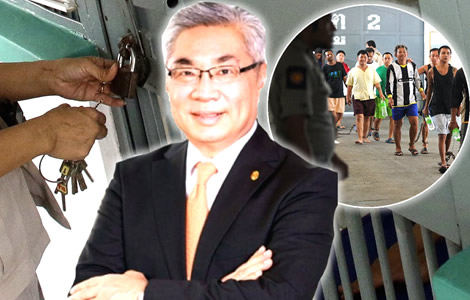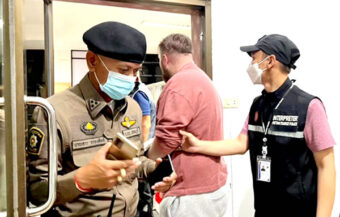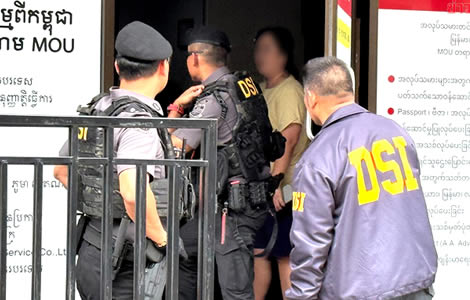Seminar hears a call for a more rehabilitative criminal justice system where petty offences are not even brought to court. Thailand has one of the highest prison inmate populations in the world and more people behind bars than any other ASEAN nation.
A seminar in Bangkok on Friday heard that Thai prisons are now so overcrowded that many inmates can not find a metre of space to sleep on the floor while 87% of female inmates were behind bars on charges relating to methamphetamine.

A seminar in Bangkok on Friday attended by the Thailand Institute for Justice and the National Human Rights Commission addressed the problem of chronic overcrowding in Thailand’s prisons.
Seminar held on Friday to address the issue of Thailand’s corrections system and human rights
The conference which took place at the Grand Centara Hotel on Chaeng Watthana Road in the heart of the government complex there heard that the situation in prisons is now so pressing that inmates do not have enough space to lie down properly at night. The seminar addressed the question of Thailand’s corrections policy and the issue of human rights.
Estimates for the number of inmates in Thai prisons range from 300,000 to 400,000
There are various estimates for the seething numbers in Thai prison varying from 300,000 to 400,000 and indeed the figure constantly varies but the official capacity of the prison network is 120,000 inmates.
The biggest single factor that is driving the overcrowding is the drug methamphetamine. Remarkably, over 70% of men in Thailand’s prisons and an eye-popping 87% of female prisoners are behind bars for being involved with the drug which is still infiltrating the population as huge quantities of the substance are smuggled out of the golden triangle into Thailand at lower and lower prices.
Thailand’s criminal justice system must be looked at according to speakers with to reduce prison numbers
The seminar addressed this issue on Friday but looked to the wider context of the overall justice system. Speakers highlighted that although Thailand has the highest inmate population in ASEAN and reportedly the sixth-highest prison population in the world which is, in fact, topped by the United States, it does not have the highest crime rate.
The distorting effect of the methamphetamine drug is a major factor in this but also criminal justice policy which in recent years has drifted back to focusing less on rehabilitation and more towards throwing the book at criminals.
75% of the Corrections Department’s budget or ฿8 billion is spent on food for the prison population
This is not to say that Thailand’s Department of Corrections is not committed to rehabilitation. However, 75% of the ฿12 billion budget allocated to the prison service is spent on food and if the prison is overcrowded then this reduces or constrains the corrections department’s scope for reforming inmates as it battles with an overcrowded population in the first place. Figures show that 30% of prisoners released from Thai prison go on to offend again.
20% of prisoners are on remand facing charges
The seminar was addressed by Kittipong Kittayarak who is the Director of the Thailand Institute for Justice. He emphasised the problems that Thai prisons are facing over the methamphetamine drug and the strict application of the law that is landing more people behind bars. He also pointed out that 20% of the people in Thai prison at any one time are there on remand awaiting trial.
He said that 50% of the convicted prison population are serving sentences of 5 years or less.
Campaigner points to a programme in 2000 and 2001 which saw prison numbers drop by a third
Mr Kittpong highlighted a drug rehabilitation initiative from 2000 to 2001 which saw the Thai prison population fall from 240,000 to 160,000. The programme at that time offered rehabilitation to drug users as opposed to prison.
He also insisted that the problem was a wider one. ‘We have to admit that the number of inmates behind bars has climbed since 1994. The problems we are facing don’t just stem from the Corrections Department, but the whole justice system,’ he said.
He said that a lack of emphasis on rehabilitation has led to the present overcrowding which most observers and even some figures within the government itself feel is unsustainable.
Thailand must look to alternative approaches to minor offenders instead of prison time
Mr Kittipong called on the government to look at alternatives to prison such as monitoring devices and a different approach to drug users and petty dealers. He suggested a more enlightened policy among police and public prosecutors to keep small legal infractions away from the courts and to essentially differentiate between the big-time players in the drug trade and the small fish.
The justice campaigner outlined a vision where offenders would be offered rehabilitation while victims would receive remedies or compensation.
Raging debate in Thailand’s corridors of power
The question of the drugs war is a raging debate right now within Thailand in the political class and among government civils servants and agencies. On the one hand, there is a hardline element that insists that prison is the only deterrent and that there can be no let-up in the war on drugs. To many on this side, an easing of the policy and softening of the justice system will put a spring in the step of those driving the scourge of drugs which has such a devastating effect on Thai society and will lead to a spike in the crime rate.
Reform supporters also within government agencies
On the other hand, there are justice reform and human rights campaigners supported by some in government agencies, even those who have been involved in the war on drugs, who think the time has come for change.
Either way, something must be done about the spiralling population in the Thai prison system and soon.
Join the Thai News forum, follow Thai Examiner on Facebook here
Receive all our stories as they come out on Telegram here
Follow Thai Examiner here
Further reading:
More foreign nationals in Thai prison but there are conflicting reports on harsh conditions


















